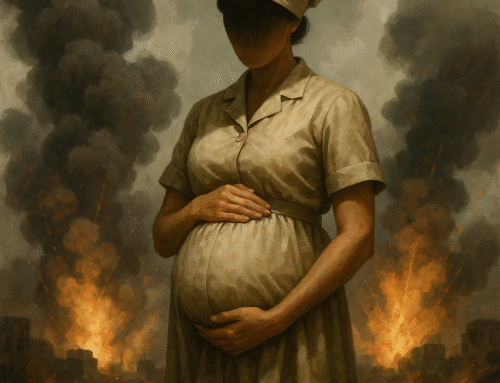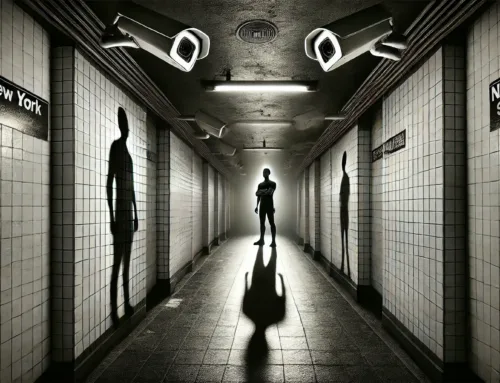The children trudged through the rubble-strewn streets, their feet sore and raw. The boy’s face remained a mask of steely focus, scanning their surroundings for any hint of danger or shelter. His sister, her steps dragging, kept glancing up at him with wide, tear-rimmed eyes. Her voice broke through the silence like a whisper that could tear open the sky.
“Why won’t anyone help us?” she asked softly. “Is it because we are too far away? Because we’re not important?”
Her questions weighed on him. He tightened his grip on her small hand but said nothing. There was no answer he could give her that wouldn’t break her already fragile heart.
They had passed checkpoints where soldiers, foreign soldiers, in clean uniforms with flags stitched onto their shoulders had watched them pass. Eyes empty, hands resting on their weapons. Not an offer of food. Not a gesture of comfort. Just silence.
The girl sniffed, her face red and blotchy from tears that never seemed to stop flowing. “I saw a woman on TV once,” she continued, her small voice cracking. “She said… people in other countries would come to help us. That they care. But no one is here. No one.”
He couldn’t bring himself to tell her that no one was coming.
Another explosion echoed in the distance, the low rumble shaking the ground beneath their feet. His sister flinched, squeezing his hand harder.
“Do they not care because we’re Muslim?” Her voice trembled. “Or because we speak Arabic? Are we not the right kind of people for them to care about?”
He felt something in his chest tighten painfully. The world did care, didn’t it? They said so on the news. But the world was not here. Not for them.
“They only help when they can get something back,” he thought bitterly but remained silent. The hollow promises he had overheard from adults when they still had a home about how the world would bring aid, about how justice would come now felt like cruel jokes. He looked at his sister, at the way her tiny frame seemed to carry the weight of all the questions that had no answers. How could he tell her the world wasn’t coming because their suffering didn’t matter enough?
“Do they hate us? Is that why?” she asked, her voice quieter now, almost ashamed for even wondering it aloud. “Maybe if we were from another place, they would care more??”
He had no answers, and his silence hurt more than any lie could. He wanted to tell her that the world didn’t hate them, but the way people had turned away said otherwise. There had been no Superman. No great country swooping in to save them. Just the emptiness of the sky, torn apart by bombs and missiles, and the silent soldiers who stood on the other side of the lines, watching like they were watching a distant storm and not the destruction of people.
They came upon the outskirts of a makeshift camp, tents huddled together like frightened animals, and the boy’s chest sank at the sight of it. They had passed camps before. Places where people from foreign lands visited, but they were always distant. Foreign diplomats in spotless suits, walking through the camp with pitying eyes but nothing else. The adults had told him these men would help them rebuild, that they would fix the shattered homes, but they never stayed. They came with cameras, snapped pictures of misery, and left just as quickly.
“Will they help us here?” the girl asked hopefully, her tired legs picking up the pace at the sight of the camp. “Maybe they will. Maybe this time.”
The boy couldn’t bear to take that hope away from her. He simply nodded, even as his heart twisted with the knowledge that nothing would change. They would be greeted with more hollow words, more indifference disguised as sympathy.
As they approached, a man in a polished vest and shiny boots stood at the edge of the camp, flanked by two guards. The boy noticed the insignia on his arm, marking him as one of the international peacekeepers they had heard about. He had seen them before on the TV, in the distance, and never close enough to touch. The man turned his head towards them, his eyes sweeping over their small, dirt-covered figures. There was no recognition of their humanity, no acknowledgment of the pain they carried. Only cold, professional indifference.
The boy forced himself to ask. “Can you help us? Is there a place we can stay?” His voice cracked slightly, betraying how much he hated having to ask.
The man hesitated for a moment, as if considering something, then shook his head. “The camp is at capacity,” he said flatly. “We are doing what we can, but the situation is complex. You need to move along.”
“Please,” his sister whispered, looking up at the man with wide, pleading eyes. “We just need a place to sleep… just for tonight.”
The peacekeeper didn’t bend. “There’s nothing we can do right now. I’m sorry.” But the apology was hollow. His eyes had already moved on, scanning the horizon, looking for something else, something that mattered more.
“Why do they turn us away?” she asked, her voice fragile, on the verge of breaking. “Isn’t anyone supposed to help? Why do they stand there and do nothing?”
Her words felt like needles against his skin, sharp and piercing, because he had wondered the same things but never dared ask. Why did the world turn its back? Was it because they didn’t look like the people the world cared about? Was it because their lives were happening in the wrong part of the map?
He saw another convoy of foreign diplomats driving away, a cloud of dust rising behind them. For a moment, the boy’s gaze hardened. These people came and went like ghosts, observing their suffering like it was a natural disaster, something unfortunate but far away from their own lives.
“They’ll help when it’s over,” he finally said to his sister, but the words felt dead on his tongue.
The girl’s face crumpled into tears. “But what if it’s too late by then?”
The boy had no response, his heart heavy with the weight of the truth he was too afraid to speak. He just pulled her closer, walking away from the camp, away from the false promises and hollow words. The world would not save them. He knew that now.
And the silence that echoed in the wake of that realization was louder than any bomb.


